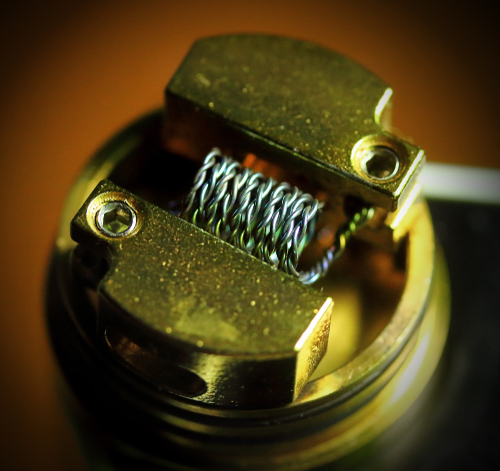
In the world of vaping, there are a vast array of coil options to choose from. However, a popular option amongst vapers (particularly, DIY coil builders) is Ni80 coils. Nichrome act quite similar to Kanthal, but with the ability to handle lower resistance in order to heat up at a rapid rate. Plus, it’s simple to coil and keeps its shape quite impressively when wicking. So, if you’re interested in using Ni80 coils, we have some awesome information to share with you about them.
What is Nichrome?
Nichrome is a type of resistance alloy composed primarily of nickel (Ni) and chromium (Cr). The name "nichrome" is a combination of "nickel" and "chromium”. It’s known for its high electrical resistance and ability to withstand high temperatures, which makes it a popular material for use in heating elements in various electrical appliances.
Nichrome alloys are chosen for their properties, including:
·High Melting Point: Nichrome alloys can withstand very high temperatures without melting, making them suitable for applications where heat resistance is critical.
·High Electrical Resistance: Nichrome alloys have a relatively high electrical resistance, which results in the generation of heat when an electric current passes through them. This property makes them ideal for heating elements.
·Oxidation Resistance: Nichrome alloys form a protective oxide layer on their surface when exposed to air, which helps prevent further oxidation and corrosion, ensuring their durability. The addition of chromium in the alloy helps improve its oxidation resistance and overall durability, allowing it to maintain its properties at high temperatures.
·Stable Resistance: Nichrome's electrical resistance remains relatively constant over a wide temperature range, which is important for maintaining consistent heating in appliances.
There are several different types of nichrome alloys with varying nickel and chromium compositions to achieve specific properties and resistance levels. Nichrome wires are commonly used in heating applications because of their ability to efficiently convert electrical energy into heat, making them essential components in many everyday household and industrial devices. The most common types of nichrome alloys include Ni80Cr20 (80% nickel, 20% chromium) and Ni60Cr15 (60% nickel, 15% chromium).
What is Ni80?
Ni80, also known as Nichrome 80, is a type of resistance wire commonly used in electrical heating elements and is composed primarily of nickel (about 80%) and chromium (approximately 20%). Ni80 is favored for its high electrical resistance and resistance to oxidation at high temperatures.
The specific composition of Ni80 may vary slightly between manufacturers, but the general nickel-chromium ratio remains consistent. Different grades of Nichrome exist, such as Ni60 (60% nickel and 16% chromium) and Ni40 (40% nickel and 20% chromium), each with varying resistance and heating characteristics to suit different applications.
What are Ni80 Coils Then and Why Do Vapers Like Them?
Ni80 coils, also known as Nichrome 80 coils, are a type of heating element that’s commonly favored by many vapers for several reasons and purposes, such as:
1.Fast Heating: Nichrome 80 has a relatively low resistance, which means it heats up quickly when an electrical current is applied. This rapid heating helps produce vapor from the e-liquid efficiently.
2.Consistency: Ni80 coils tend to provide a consistent vaping experience due to their stable resistance properties.
3.Durability: Again, since Nichrome 80 is known for its durability and ability to withstand high temperatures, this in turn then, can result from vaping at high wattages.
4.Flavor: Many vapers find that Ni80 coils offer good flavor production, as they do not impart any noticeable metallic taste to the vapor.
5.Versatility: Ni80 coils can be used in a wide range of vaping devices, from simple atomizers to more advanced rebuildable atomizers (RBAs) and rebuildable dripping atomizers (RDAs).
6.Availability: Ni80 wire and pre-made coils are readily available in the vaping market, making it easy for vapers to find and purchase them for their devices.
What Types of Resistances Can Ni80 Coils Handle?
The resistance of a Ni80 coil is determined by its length, diameter, and the specific wire gauge (thickness) used. The resistance of a Ni80 coil is typically measured in ohms (Ω). Ni80 coils are known for their predictable and stable resistance characteristics.
The resistance of Ni80 coils can vary widely depending on the specific build, but they are generally available in a range of resistances suitable for various vaping preferences and styles. Common resistance ranges for Ni80 coils in vaping applications include:
ØLow Resistance (Sub-Ohm): These coils typically have resistances below 1 ohm (Ω). Sub-ohm coils are favored by vapers who prefer high wattage and cloud production. They are often used in direct-to-lung (DTL) vaping for larger vapor production.
ØMid-Range Resistance: Coils in this range typically have resistances between 1 ohm (Ω) and 2 ohms (Ω). These coils are used for a balance between flavor and vapor production and are suitable for both direct-to-lung and mouth-to-lung (MTL) vaping styles.
ØHigh Resistance: Coils with resistances above 2 ohms (Ω) are considered high-resistance coils. These are typically used in MTL vaping, where the emphasis is on flavor and a tighter draw.
Remember, specific resistance of a Ni80 coil will depend on the coil's specifications, including the wire gauge, the number of wraps, and the coil's configuration (single coil or dual coil, for example). Vapers often customize their coil builds to achieve the desired resistance and performance.
When working with Ni80 coils, it's crucial to use an ohm reader or a regulated mod with built-in safety features to ensure that the coil's resistance is within safe operating limits. And, always follow manufacturer recommendations and safety guidelines to ensure safe and enjoyable vaping experiences.
Final Thoughts on Ni80 Coils
Keep in mind, the choice of coil material can affect the vaping experience, including factors such as flavor, vapor production, and coil lifespan. Some vapers prefer Nichrome 80 coils, while others may prefer other materials like Kanthal, stainless steel, or nickel (for temperature control vaping). The choice of coil material often comes down to personal preference and the type of vaping experience an individual is looking for.
